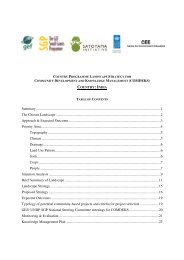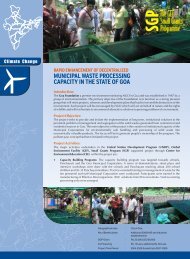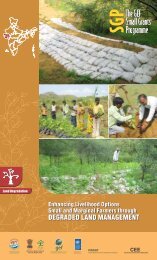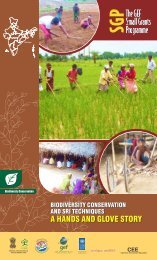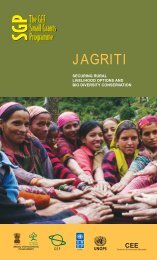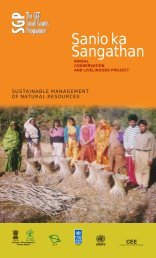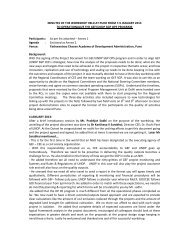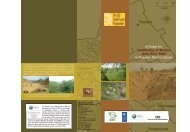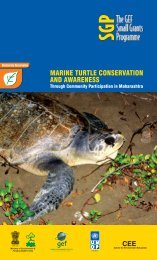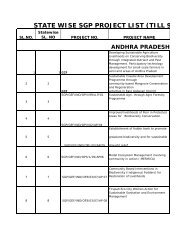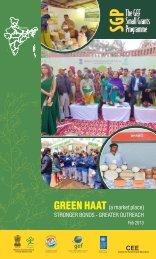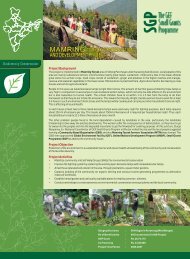MAINTAINING CONSERVATION IN
Maintaining Conservation in Yak and Demo with the Tribal Pas...
Maintaining Conservation in Yak and Demo with the Tribal Pas...
Create successful ePaper yourself
Turn your PDF publications into a flip-book with our unique Google optimized e-Paper software.
Biodiversity Conservation<br />
<strong>MA<strong>IN</strong>TA<strong>IN</strong><strong>IN</strong>G</strong> <strong>CONSERVATION</strong> <strong>IN</strong><br />
Yak and Demo with the Tribal Pastorals in<br />
Semi Artic Ladakh Regions<br />
Project Background<br />
This project is related to the Ladakh 2025- Vision document which is focussed on building every child and creates a<br />
Happy Ladakh. The project addresses the key concerns in maintaining local animal biodiversity, conservation<br />
practices and by strengthening Ladakhi traditional system of agriculture and livestock production, through the Yaks. It<br />
is a multi utility animal as it also supplies milk (Fat % 9-11), meat, hides, wool hair, (woven into cloth for making tents,<br />
ropes etc), manure, fuel as well as transport for man and merchandise and drought power for ploughing even in snow.<br />
Without the Yak, travel and trade in desolate trans-Himalayan regions would be extremely difficult.<br />
Yaks occasionally suffer from foot and mouth disease and some respiratory ailments. Rinderpest disease that reportedly<br />
badly affects Yaks in other parts of the world, but is not prevalent in Ladakh.<br />
The projects through CENS FOOD maintain to focus on the local cows cross-bred with the yak (Male) to produce the<br />
Dzo (Male) and Dzomo (female). The hybrid “Dzo” is found to be infertile but as pack animal and its draft ability has<br />
great importance in the agricultural economy of the area. The “Dzomo” is found to be fertile and higher yielder than the<br />
Yak female (Demo) and the local cow and is popular as dairy animal in the areas where yaks abound. 'Dzo' and<br />
'Dzomo' are found to be as well adapted to higher altitudes as the Yak but are better adapted to lower altitudes than the<br />
yak and here the 'Dzo' is an important drought animal.<br />
Project Objectives<br />
• Optimize declining livestock breed conservation practices, maintenance and rearing live stock production.<br />
• Emphasize the role of livestock in agriculture and promote sustainable rangeland livestock systems, through<br />
community management and ownerships.<br />
• Empower the resource poor herders; tribal women and farmers through local institution building measures and<br />
through conservation of 2 livestock breeds of Yak and Demo.<br />
Project Activities<br />
• Develop baselines using participatory techniques PRA in 3 villages of Fulak, Liktsey and Tukla<br />
• Community mobilization and formation of Self Help Groups (SHG)/ village committees.<br />
• Identify the native and better breeds of YAKs for better breeding / conservation practices.<br />
• Develop Breed Herder Associations (BHA). Foster capacity building for book keeping/records both at SHG's<br />
level and the BHA level. BHA is the committee responsible for Yak maintenance.<br />
Geographical area : 3 Villages.<br />
No. of Beneficiaries : 81 Households.<br />
SGP Grant : Rs. 9,69,000<br />
Co. Financing : Rs. 11,59,000<br />
Project Time Period : 2007-2009
• Identify the Yakzis in each village. Agree norms for the payments/role-responsibilities and<br />
accountability of the Yakzis. Exposure visits of neighbouring villages to the project.<br />
• Facilitate Veterinary camps with local health/ livestock department. Creating and agreeing<br />
norms for health camps with SHG members.<br />
• Women to be integrated as equal partner in the SHGs.<br />
Project Results<br />
CENSFOOD, local LEH based NGO approached the Global Environment Facility (GEF) United Nations Development<br />
Program (UNDP) Small Grants Program (SGP) to address the conservation and biodiversity issues on the YAKs. The<br />
project through a series of village meetings in 3 villages, created two women SHGs with 35 women members. The<br />
project has institutionalised 3 YAKZIS, (local herders) to take care of more than 410 YAKs, DEMOs, and DZO from the<br />
81 HHs from 3 villages. Out of the three, one is a woman YAKZI, these resilient locals live in the most inclement<br />
weather conditions for more than 9 months in a year rearing and conserving the breeds of the YAK. They are also<br />
separated from the world, their families and as a separated group take care of the cattle herd in the highland pasture<br />
during the summer in 5-7 different valleys. During winter they take the cattle to the mountains for grazing and in the<br />
evening bring back to their village. The YAKZIS are also given training on the livestock management with the help of<br />
line departments in Leh. Each HH family is making a contribution of Rs.10/- per month to avail of this service through<br />
the BHA called as YAK GUSPHEL TSOKSPA. The funds are kept in a separate bank account managed by Sonam<br />
Lundup. The funds raised in the BHA will ensure the sustainability of the program in future. The NGO is guided through<br />
this process approach by Centre for Environment Education (CEE). The communities in the villages are also raising<br />
plantations of local tree species including see buckthorn.<br />
The project in synergy through other donors like National Foundation of India (NFI) and Food and Agricultural<br />
Organisation (FAO) is also addressing the local needs for Green Houses, and solar driers for vegetables, plantations of<br />
local species established through the SHGs in the villages<br />
Role of Communities<br />
CENSFOOD in the project has developed 2 women based (SHGs) with nearly 35 Households (HHs) as members and<br />
with a total savings of Rs 10,000. The women SHG are providing greater leadership in taking the activities in the<br />
villages. They are trained in managing the local savings and credit and book keeping in the SHG. The links to the banks<br />
are also established. Although, they have to come to Leh or locally in 25 kms to meet deposits. The communities<br />
through the SHG village elders; local panchayats and other officials have formed the BHA with all 81 HHs of 3 villages<br />
as members with a total savings of more than Rs 20,000. The effort in the programme is to make it community owned<br />
right from the very inception so that it can be made more sustainable undertaking a range of issues.<br />
Project Lessons and Impacts<br />
• Link with the respected community leaders (Rev. KASAPA Monk and Mr Dorjey Mutup) in the areas by the NGO<br />
led to develop mutual trust between the NGO and communities. Later open, reflective ways of working further<br />
cemented the partnership..<br />
• Addressing the local needs of the communities by introducing the YAKZI model led to greater confidence within<br />
the project. The local institution building has led to more local ownership.<br />
• Process and a participatory methodology adopted in addressing range of issues, and local concerns of the<br />
unreached communities, in the areas has led the NGO to approach different institutions. This holistic approach<br />
enabled a better focus, synergy in administrative costs and activities as a pilot model.<br />
Text by P.S. Sodhi<br />
Centre for Sustainable Development<br />
and Food Security in Ladakh (Regd.)<br />
PO Box No. 53, Ser-Dung House,<br />
Chubi Leh-Ladakh-194101 (India)<br />
Tel.: 01982-255640 Fax : 01982-255641<br />
Email : censfood@hotmail.com<br />
Regional Co-ordinator<br />
C-40<br />
National Co-ordinator<br />
GEF UNDP Small Grants Programme<br />
CEE Delhi,<br />
C-40 South Extension Part-II,<br />
New Delhi-110049 Ph.: 011-26262878-80<br />
E-mail : sgpdelhi@ceeindia.org<br />
www.sgpindia.org www.ceeindia.org<br />
Ministry of Environment &<br />
Forests (MoEF), India<br />
www.sgpindia.org



